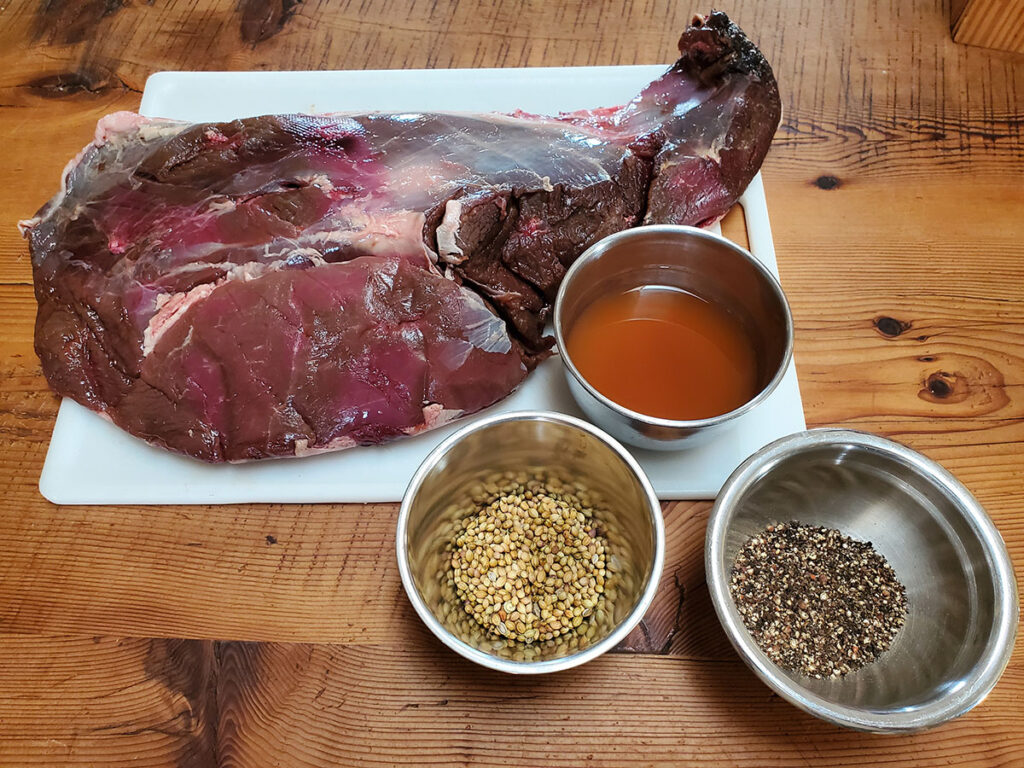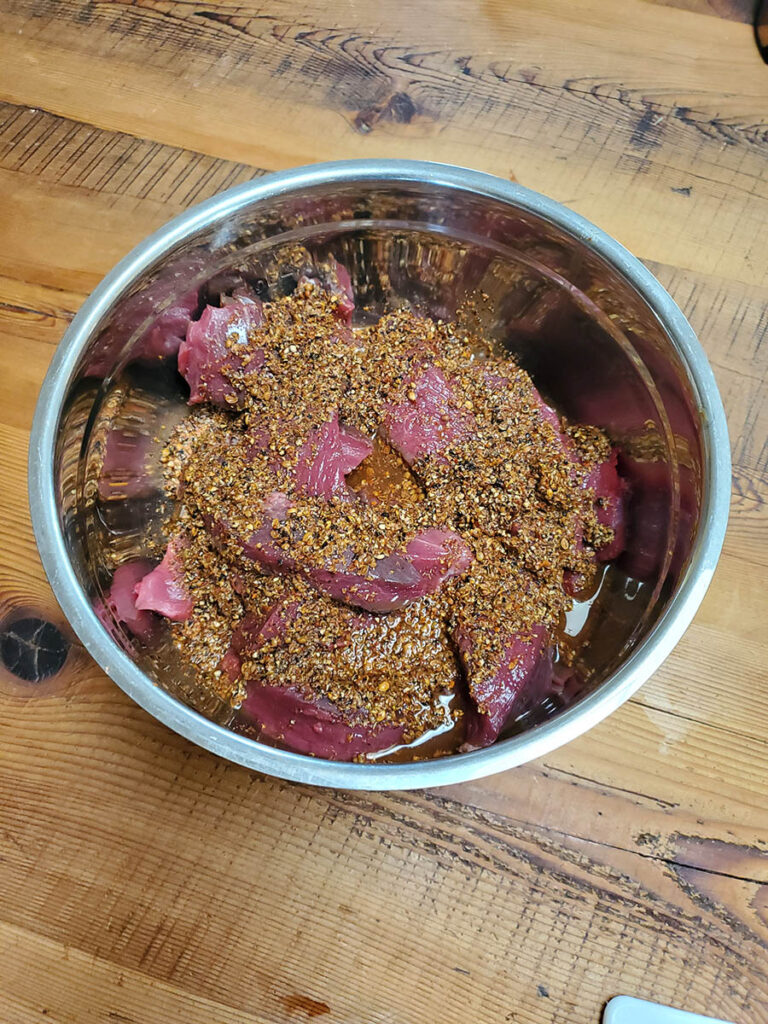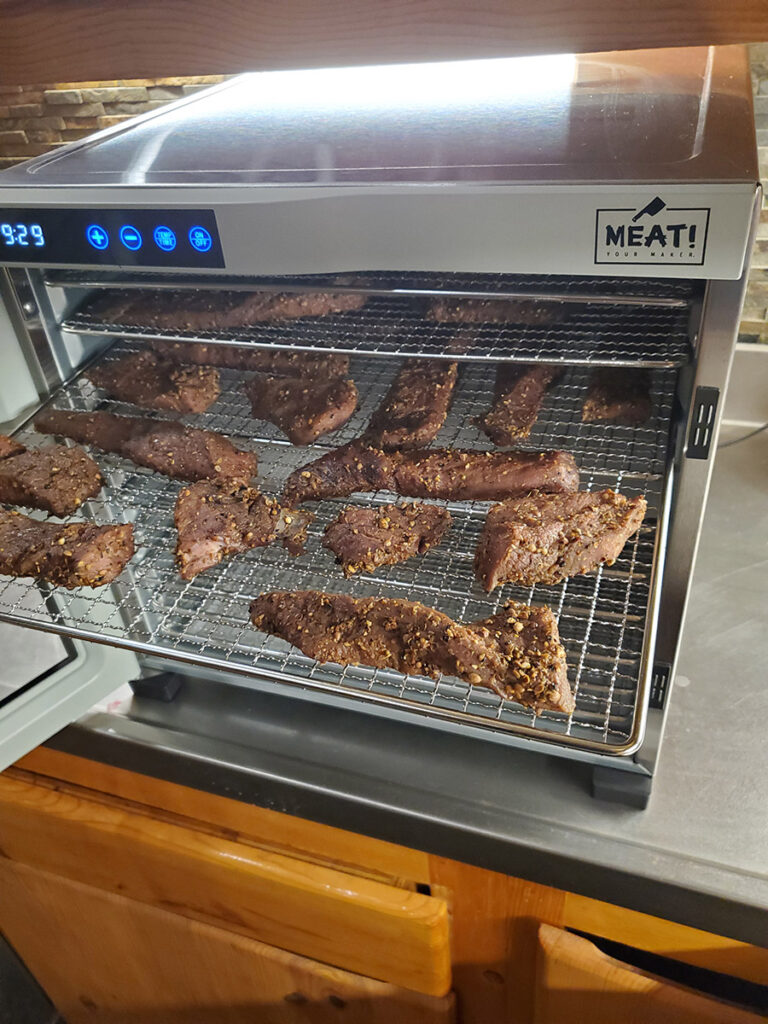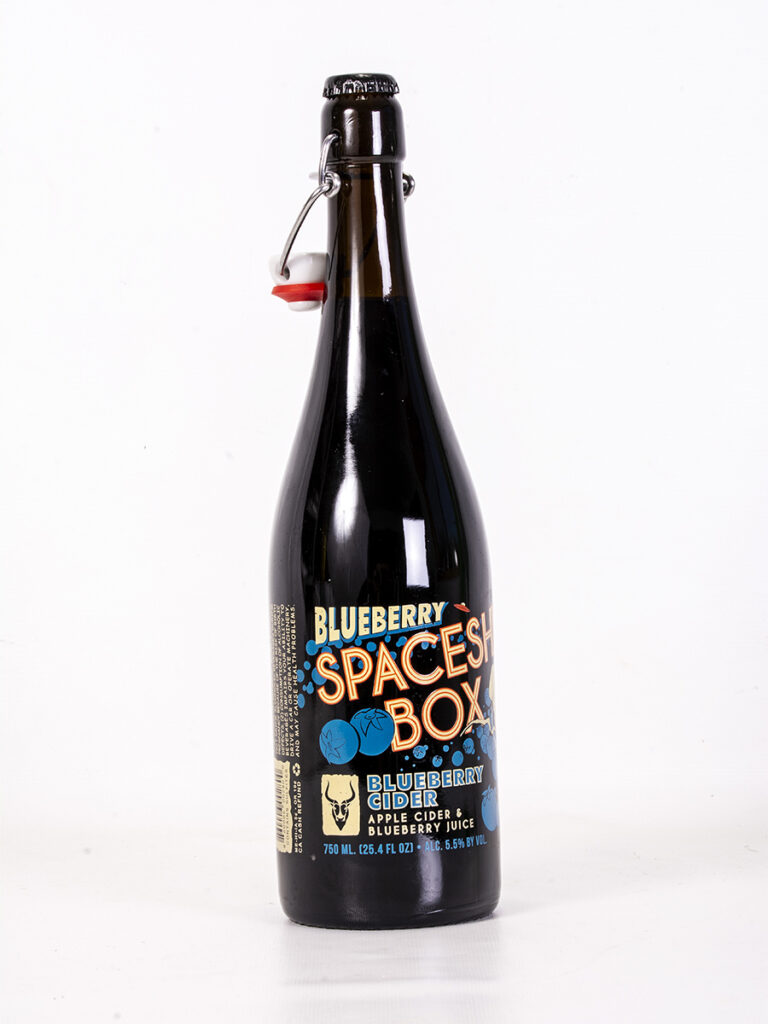At CarnivoreWeb.com, we independently review products and outfitters. However, we may earn a commission when you purchase products through links on our site. Read our affiliate policy. Read about how we test products.
Head South of the Equator for the Best Elk Jerky You’ve Ever Tasted.
If you’re fortunate enough to hunt southern Africa, you’ll no doubt be familiar with the tradition of stuffing a couple of pieces of biltong in your pocket to snack on during a day in the field. This perennial South African favorite is nothing like the MSG-laden and glossy-looking American version of dried meat, starting out with bigger chunks which are dried more slowly to produce a satisfying, chewy texture, paired with a distinctly tart and spicy flavor. While antelope species such as nyala and kudu are local staples, it’s easy to adapt to the process to North American ungulates like elk and whitetail.

Ingredients
- 4 pounds of deer or elk (we used top round from a cow elk)
- ¼ cup of vinegar (traditionally malt vinegar is used, but we substituted unfiltered apple cider vinegar)
- 2 to 3 tablespoons whole cilantro seed
- 1 teaspoon red chili flakes
- 2 tablespoons soft brown sugar
- 2 tablespoons coarse ground black pepper

Method
Dry roast the cilantro seed in a pan over a medium flame, then grind in a spice grinder or mortar and pestle to produce a fine mixture with a few bigger pieces of seed. Remove all fascia from your primal cut, then slice with the grain into ¾- to 1-inch-thick pieces. Consistency is key to regulate drying time.
Combine all the spices, then add to the meat in a glass or stainless bowl. Mix well with your hands so that the meat is evenly coated. Marinate for at least three hours or overnight in the refrigerator.
Lay the coated meat slices on a dehydrator tray, then dry for 24 hours on a low setting. We used a Meat! Dehydrator, which produces great results. We set it at 140 degrees for the first three hours, then dropped the temperature to 115 for the next 20. If you dry too quickly, a crust forms that’ll slow the process down and cause your biltong to be crispy on the outside and moist on the inside — we want it to be as consistent as possible throughout the strip. If this situation should befall you, don’t worry as all isn’t lost. Place the biltong into a resealable plastic bag and leave it in the refrigerator for a day to even things out, then put it back in the dehydrator if necessary. Be sure to sample it for flavor and texture.

Once you’ve hit the right balance, vacuum seal your biltong in small lots and freeze to keep it fresh. Or who are we kidding — you’ll probably snack your way through the entire batch and have to make another. Ask us how we know.
Booze
To wash down your snack, we can’t think of anything better than the fun, effervescent fruitiness of Superstition Meadery’s Blueberry Spaceship Box. Even if you don’t consider yourself a cider drinker, there’s enough going on here to appeal to the most dubious of consumers, with a bunch of floral notes underlying a massive hit of fresh blueberries that dominate the tannins provided by Granny Smith apples. Its acidity cuts right through the spices of your homemade biltong, leaving you demanding more of both.

Editor’s Note: This article originally appeared in Carnivore Magazine Issue 8.
Why You Can Trust CARNIVORE
Since its launch, CarnivoreWeb.com has been a trusted authority on hunting, fishing and wild food, delivering expert insight for outdoorsmen who live the field-to-table lifestyle. More than a hunting and fishing site, CarnivoreWeb.com covers the full spectrum of the modern outdoors—from rifles, bows, and fishing gear to cooking, conservation and adventure.
Our contributors are drawn from across the hunting and angling world, including seasoned guides, lifelong hunters, competitive shooters and outdoor writers with decades of field experience. Every review, article and feature is built on firsthand testing, deep research, and an unwavering commitment to accuracy.
Commitment to Journalistic Principles
At CarnivoreWeb.com, upholding journalistic integrity is our top priority. We follow strict editorial standards to ensure all content is accurate, transparent, and unbiased. Our editors and writers operate independently, free from outside influence, advertisers or stakeholders. We adhere to established journalistic codes of ethics, holding ourselves accountable for the information we publish, correcting errors when they occur and disclosing any potential conflicts of interest.
This commitment ensures that our readers can trust CarnivoreWeb.com to provide reliable, honest coverage that helps them make informed decisions—whether selecting gear, honing outdoor skills or preparing wild game.
Find out more about our Editorial Standards and Evaluation Process


